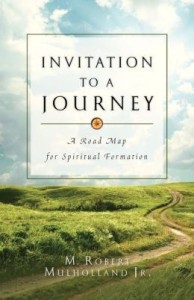As a part of my job, I have the great pleasure of reading good books about living the Christian life. I want to provide a brief review of two such books here.
Mulholland, Jr., M. Robert. Invitation to a Journey: A Road Map for Spiritual Formation. IVP Books, 1993. 173pp.
As the title suggests, Mulholland’s book is about the Christian journey toward “spiritual wholeness.” He defines spiritual formation as “a process of being conformed to the image of Christ for the sake of others” (12). The book is divided into four sections.
In the first section Mulholland dissects his definition of spiritual formation into four parts. The first part of spiritual formation is to recognize that spiritual formation is a process, not an event. Second, it is a process of “being conformed.” In other words, this is not something we do to ourselves. He writes, “The difference between conforming ourselves and being conformed is the vital issue of control” (25). Third, it is being conformed into the image of Christ. Mulholland argues that the image of Christ is the “fulfillment of the deepest dynamics of our being” (33). Finally, being conformed to the image of Christ is ultimately for the sake of others.
In the second section of the book Mulholland relies heavily of Carl Jung and the Myers-Briggs Type Indicator (MBTI) personality test. He argues that each person has a unique personality type and understanding one’s personality type helps one grow in holistic spirituality.
Mulholland deals directly with various spiritual disciplines in the third section. He describes the classical Christian pilgrimage as “awakening, purgation, illumination, and union.” He discusses the spiritual disciplines of prayer, spiritual reading, and liturgy. He helpfully shows how God works in the Christian life to wage war against death and bring life (120-34).
In the final section Mulholland underscores the importance of the faith community for spiritual formation.
Mulholland writes from a Wesleyan theological perspective. This, in itself, is not an issue, but because he is writing from this perspective, he makes some rather elementary exegetical fallacies so that his exegetical conclusions fit his theological perspective. I’ll highlight just one such fallacy. His exegesis of Ephesians 1:3-6 is flawed by a simple word study fallacy. Mulholland argues that the Greek word (eklegomai) which means and is translated “chose” (Eph 1:4) by every major English translation really means “spoke forth” since it is a compound word with the respective parts of the compound meaning “forth” (ek) and “speak” (lego). This is a rather elementary fallacy since compound words do not necessarily have the meaning of the sum of each part. For example, we all know that a pineapple is not a special type of apple that grows on pine trees!
Without question the strongest part of Mulholland’s book is his attention to the fact that spiritual formation does not happen in isolation. We are created as communal creatures and God has designed us to live and flourish in community. Mulholland argues that not only is the end result of spiritual formation “for the sake of others” (see definition above), but even the process of spiritual formation is in the context of others. One quote will suffice even though this theme is beaten like a drum throughout the book. He writes, “There is no holistic spirituality for the individual outside of the community of faith” (50).
Recommendation
I would recommend this book for the discerning Christian reader who is interested in spiritual formation.
Thornborough, Tim, and Richard Perkins, eds. The Big Fight: Christian Men  vs The World, Flesh & Devil. The Good Book Company, 2012. 107pp.
vs The World, Flesh & Devil. The Good Book Company, 2012. 107pp.
A total of 10 contributors come together to write this very helpful book for men who are pursuing holiness. Each contributor wrote one chapter of particular interest to men (although it must be stated that these are not solely men’s issues).
The “G” key on the keyboard got stuck in the naming of the chapters: Guilt, Gold, Gossip, Glare, Grumbling, Gospelling, Girls, Gifts, Grog, and Games. A preacher must have come up with the titles for each chapter!
The book is written so that it could be used for a small men’s group or one-on-one, or it could be read and used by a single individual.
None of the chapters are written to be particularly deep theologically, but every chapter is immensely practical. This is certainly by design and it does not detract from the book in any way. Every chapter includes discussion questions and recommendations of further resources for reading.
Recommendation
I would gladly recommend this book to a man or a men’s group.



